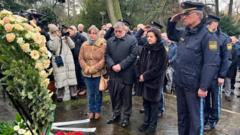In the wake of violence, Friedrich Merz promises to tighten border controls and deny entry to irregular migrants while Chancellor Scholz condemns the attack as an "act of terror."
**German Political Leaders Push for Stricter Immigration Policies After Knife Attack**

**German Political Leaders Push for Stricter Immigration Policies After Knife Attack**
After a deadly knife attack targeting children, German leaders are calling for urgent reforms in asylum and border policies.
The conservative opposition leader, Friedrich Merz, has vowed to implement stringent changes to Germany's border and asylum policies following a tragic knife attack in Aschaffenburg, which resulted in the deaths of a two-year-old boy of Moroccan descent and a 41-year-old man. Several others sustained injuries in the incident attributed to a 28-year-old Afghan man, who will appear in court facing murder charges. Merz declared that he would send a directive to the interior ministry to enforce permanent border controls, essentially closing Germany's doors to irregular migrants, even those with a legitimate claim to protection.
The attack, which has heightened fears of security in the nation, drew quick condemnation from Chancellor Olaf Scholz, who labeled it an "act of terror," but officials have yet to confirm any terrorist motivation behind the assault. The Afghan suspect was reported to have arrived in Germany in 2022 and had ties to previous violent incidents, raising alarms about asylum protocols.
Merz, leading in the polls ahead of the upcoming federal elections on February 23, criticized the past decade of asylum policies under Angela Merkel's leadership, during which Germany accepted over a million refugees amid the migrant crisis. He described existing EU asylum regulations as "dysfunctional" and insisted that Germany must prioritize national law.
While border checks already exist as a temporary measure to combat illegal immigration, Merz is advocating for permanent enforcement. He also indicated plans to bolster the detention capacity for deportations significantly. His proposed moves echo certain themes from U.S. immigration policy, highlighting a potential shift towards a more hardline approach in Germany.
Notably, both Merz and Scholz are keenly aware of the rising popularity of the far-right Alternative for Germany (AfD), which has placed immigration at the forefront of its agenda. AfD leader Alice Weidel has called for swift parliamentary action in light of the Aschaffenburg attack, urging immediate measures to prevent the entry of irregular migrants.
However, critics caution that the tougher stance may simply lend credence to the far-right narrative. The complexities of German politics, where coalition-building is essential, may limit Merz's ability to enact his proposed changes. Christian Lindner, leader of the Free Democratic Party, warned against unrealistic expectations for instant reforms if a coalition includes leftist parties. Meanwhile, Interior Minister Nancy Faeser admonished against using the tragedy for populist purposes, arguing such tactics only empower right-wing populism while undermining the humane aspect of asylum.
In investigating the Aschaffenburg attack, not only did a 72-year-old man suffer serious stab wounds, but a kindergarten teacher also sustained injuries while reportedly trying to protect children during the incident. The swift response of individuals at the scene, especially the act of bravery shown by the man who lost his life, has garnered commendation as a deeply human response to a senseless act of violence.
The attack, which has heightened fears of security in the nation, drew quick condemnation from Chancellor Olaf Scholz, who labeled it an "act of terror," but officials have yet to confirm any terrorist motivation behind the assault. The Afghan suspect was reported to have arrived in Germany in 2022 and had ties to previous violent incidents, raising alarms about asylum protocols.
Merz, leading in the polls ahead of the upcoming federal elections on February 23, criticized the past decade of asylum policies under Angela Merkel's leadership, during which Germany accepted over a million refugees amid the migrant crisis. He described existing EU asylum regulations as "dysfunctional" and insisted that Germany must prioritize national law.
While border checks already exist as a temporary measure to combat illegal immigration, Merz is advocating for permanent enforcement. He also indicated plans to bolster the detention capacity for deportations significantly. His proposed moves echo certain themes from U.S. immigration policy, highlighting a potential shift towards a more hardline approach in Germany.
Notably, both Merz and Scholz are keenly aware of the rising popularity of the far-right Alternative for Germany (AfD), which has placed immigration at the forefront of its agenda. AfD leader Alice Weidel has called for swift parliamentary action in light of the Aschaffenburg attack, urging immediate measures to prevent the entry of irregular migrants.
However, critics caution that the tougher stance may simply lend credence to the far-right narrative. The complexities of German politics, where coalition-building is essential, may limit Merz's ability to enact his proposed changes. Christian Lindner, leader of the Free Democratic Party, warned against unrealistic expectations for instant reforms if a coalition includes leftist parties. Meanwhile, Interior Minister Nancy Faeser admonished against using the tragedy for populist purposes, arguing such tactics only empower right-wing populism while undermining the humane aspect of asylum.
In investigating the Aschaffenburg attack, not only did a 72-year-old man suffer serious stab wounds, but a kindergarten teacher also sustained injuries while reportedly trying to protect children during the incident. The swift response of individuals at the scene, especially the act of bravery shown by the man who lost his life, has garnered commendation as a deeply human response to a senseless act of violence.




















